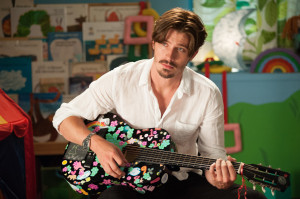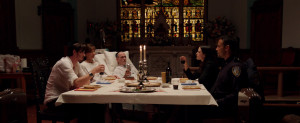(DVD, Digital and Video-On-Demand; AVENUE PICTURES/ARC ENTERTAINMENT (117 minutes/Rated R); 2014)
I’m gonna let you guys into my life and my head and my heart for a little bit. I’m a sensitive guy… no, really, I am. Movies like this one touch me. I shed a tear or two watching LULLABY. Why? Good story, good acting? Partly, but the main reason is this: The underlying premise of the movie is something that is very near to me (I can’t say “dear” because… CANCER SUCKS!). In a span of approximately 10 years, I lost my father, my sister and my brother to cancer. My brother-in-law, a couple of beloved uncles and an aunt, too, during that same period; my sister-in-law succumbed to liver failure, as well. In the middle of all of that, my mother was diagnosed with Alzheimer’s Disease. I act as her caregiver… I’m the only one left. I watch her die a little bit more each day. I’ve spent far too many days in hospital rooms and funeral homes and I know that I’ve got more of both in my future. Look… I’m not complaining. I’m just using my experiences as a reference point for a review of the movie, LULLABY. Knowing these things may help you understand (at least a bit) where I’m coming from in regards to this film.

Garrett Hedlund leads a strong ensemble cast as Jonathan, the wayward son of a well-to-do family. LULLABY is a bitter-sweet coming-of-age story for Hedlund’s character. Jonathan is coming home after several years; his cancer-stricken father has decided to end his suffering. In short, the father (brilliantly played by Richard Jenkins) is – according to the statutes of the State of New York – committing suicide, with the assistance of his well-meaning doctor (Terrance Howard in a small role that amounts to no more than a couple of short cameos… what Howard does with those cameos speaks to the power of, not only his talents, but those of the entire cast). Jonathan reluctantly returns, telling his mother (Anne Archer), “He’s been dying for twelve years!” and asking, “Why is this time any different?” When she explains his father’s plan, Jonathan, enraged, storms out of the room. Taking refuge in the hospital’s stairwell, he lights a cigarette (he seems always to be getting into trouble for smoking in places where it’s prohibited… the film opens with him lighting up in the airplane restroom and, later, he walks into the hospital lobby and lights another smoke… both scenes are actually pretty funny) and practices a little primal screaming. He soon discovers, however, that he isn’t alone; a couple of flights above is a young woman who, like his father, is dying of cancer. Meredith (Jessica Barden) is a wise-beyond-her-years high school senior who hides her pain and fear behind a tough facade; when she asks for a cigarette, Jonathan gives her a look. “What? You gonna tell me that it’ll kill me?” Through his interaction with Meredith, the troubled musician is humbled and begins to look inward at who he is and what he’s become. There are several scenes between the pair that some may call “schlocky,” but they are so sweet and gentle that you can’t help but be touched.

Other key elements leading to Jonathan’s growing up involves an ex-girlfriend (another small but pivotal role, played by Amy Adams), his “I’m way too good for this” sister, Karen (Jessica Brown Findlay), who is struggling with her own demons. She files an injunction to stop her father from going through with his plans and comes unglued when he tells the family that he gave all of his money to charities and other causes. There’s a great scene where she comes clean to Jonathan, growing up a bit herself. The mother, Rachel, goes through several stages of grief, alternately being the strong woman holding the family together as she always has or completely falling apart, railing against the situation, her husband and God. One of Robert‘s last requests is to bring his family together for the traditional Passover Seder, performing the ritual early because he won’t be around at the Passover and because this is the first time in seven years that his whole family has been together. The scenes in the hospital’s chapel are powerful, heartwarming and… funny. You’ll understand when you watch. I should mention Jennifer Hudson as the in-your-face, tell-it-like-it-is nurse who first confronts Jonathan as he enters the hospital lobby, lighting a cigarette. She’s featured prominently in another heart-wrenching episode with Robert and Jonathan.

So, I know that I’m kinda skating around a lot of important stuff here, but I hate to be one of those guys that give away every detail of the movie. Ultimately, all I can do is recommend that you watch LULLABY with a box of tissues on hand. The subject matter and some strong language may be too intense for the young’uns, but it could open up a dialogue with junior high school aged kids (and older) who may be going through (or will eventually experience) similar situations. I told you at the top of this piece about my experiences. Obviously, they weren’t nearly as dramatic as those of the Lowenstein family, but they left there marks. LULLABY isn’t the type of movie that opens up old, painful memories; rather, it brought back some feelings that are really just under the surface: warm, happy memories of the people I love. And… okay… some sad ones, too. I honestly don’t believe that there’s a day that goes by that I don’t think about picking up the phone and calling my Dad or my sister or my brother. If you’ve lost someone close, you know what I mean. One of the most jarring aspects of LULLABY is Richard Jenkin’s make-up. As Robert becomes weaker and nears the end, there are moments when I could see my father’s face, sallow and small (he was always so much bigger than life to me), but with a peace that came from the knowledge that his pain and suffering was at an end and he was going home. That alone was worth the price of admission.

